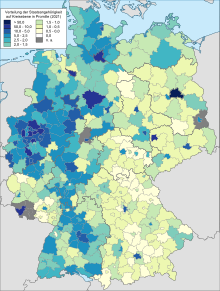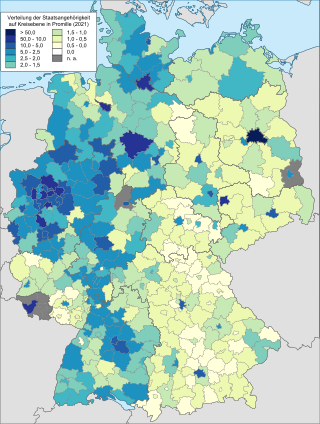Syrians in Germany
Residents of Germany of Syrian descent From Wikipedia, the free encyclopedia
Syrians in Germany (Arabic: السوريون في ألمانيا, romanized: al-Sūrīyūn fī Almāniyā) refers to Syrian immigrants in Germany, or Germans with Syrian ancestry. The number of people with an immigration background from Syria, including those with German citizenship, was estimated at around 1,281,000 in 2023.[1] Additionally, the population with Syrian citizenship residing in Germany is 972,460 in 2023,[3] making it the second-largest group of foreign nationals living in the country.[4] Notably, Germany boasts by far the largest Syrian diaspora outside of the Middle East.[5]
Syrer in Deutschland | |
|---|---|
 Distribution of Syrian citizens in Germany (2021) | |
| Total population | |
| 1,281,000 (2023)[1] | |
| Regions with significant populations | |
| Berlin, Frankfurt, Hanover, Munich, Stuttgart, Köln, Salzgitter, Dortmund | |
| Languages | |
| Arabic, Kurdish, Turkish, Neo-Aramaic, German | |
| Religion | |
| Majority: Sunni Islam Minority: Twelver Shia, Alevism, Alawites, Sufism, Isma'ilism Christianity (mainly Syriac Orthodox Church, minorities Eastern Catholic Churches, Oriental Orthodoxy) Druze[2] |
The population consists mainly of refugees from the Syrian Civil War, who arrived during the 2015 European migrant crisis.[6] In 2018, Germany granted 72% of Syrian refugees protection for the right to work without any setbacks or restrictions.[7]
Significant Syrian communities exist in Berlin, especially in the district of Neukölln and in the Ruhr-Area.
Migration history
Summarize
Perspective
Pre-civil war migration
Even before the outbreak of the Syrian civil war in 2011, Germany had a significant population of Syrian migrants, with religious and ethnic minorities such as Assyrians over-represented in the population. Many opponents of the regime in former Ba'athist Syria under Bashar Al Assad, especially Syrian Sunni Muslims and Palestinians have also sought refuge in Germany.

Migration during the civil war
However, the overwhelming majority of Syrians who have arrived in Germany migrated to the country after the outbreak of the Syrian Civil War in 2011.
During the European migrant crisis of 2014-2015, hundreds of thousands of Syrian refugees of the Syrian Civil War entered Germany to seek refugee status. The European migrant crisis was eased on September 4, 2015, by Chancellor Werner Faymann of Austria and Chancellor Angela Merkel of Germany. They announced that migrants would be allowed to cross the border from Hungary into Austria and onward to Germany. On the morning of September 5, 2015, buses with migrants began crossing the Austro-Hungarian border.[8][9]
Germany's number of asylum applicants, mostly consisting of Syrians, peaked at 890,000 in 2015, however, the trend began to reverse. In 2018 for instance, only 185,000 Syrians applied for asylum in Germany, although Syrians still continue to be the far largest group of Asylum seekers since 2013.
Most Syrians have been granted subsidiary protection, which makes them a permanent resident with the right to work and eligible for German citizenship after 5 years of residency.[10] In 2023, they were by far the biggest group of foreign nationals receiving German citizenship.[11]
Fall of the regime
After the Fall of Damascus on 7 December 2024 and Bashar al-Assad fleeing to Moscow, politicians campaigning for Germany´s 2025 election, asked for the 973,905 Syrians in Germany to return to Syria,[12] while others feared that the sunni islamist HTS rebels, in charge after the fall of the regime, may not be willing to honor fundamental rights like freedom of religion and warned of hasty returns. The processing of new applications for asylum for Syrians was halted by the Federal Office for Migration and Refugees.[13]
Demographics

A large proportion of Syrians have settled in large West German cities, particularly in the Ruhr area and Berlin, where there was already a large Arab-Levantine community, consisting mainly of Lebanese and Palestinian migrants who arrived in the 1980s. However, there is also a sizeable Syrian community in eastern Germany, particularly in the largest cities such as Leipzig and Dresden, where they are the largest non-European immigrant group.[14]
Integration
Although most Syrians automatically receive the right to work under German law, many German politicians and journalists have criticised the relatively high level of benefit dependency among Syrian migrants. In 2023, after most had been in Germany for 8 years, 55% of Syrians were dependent on benefits, compared to 5.3% of their German counterparts.[15][16]
The relatively high crime rate among Syrians,[17] especially among young Syrian men, has also been the subject of political debate. In June 2024, after an 18-year-old Syrian allegedly killed a 20-year-old man in the town of Bad Oeynhausen who had just returned from a school graduation ceremony, many politicians in Germany called for deportations to Syria, especially of those involved in criminal activities. Discussing the murder, the Minister-President of North Rhine-Westphalia Hendrik Wüst called for deportations of foreign nationals, "regardless of where they are from". Several days later German chancellor Olaf Scholz also called for deportations to Syria, although Germany has no official embassy in the country since the outbreak of the civil war. [18]
Notable people (extract)


- Ijad Madisch, CEO and founder of ResearchGate
- Aias Aosman, footballer
- Mike Josef, Lord Mayor of Frankfurt
- Mahmoud Charr, Boxer
- Mahmoud Dahoud, footballer
- Rasha Nasr, politician
- Mamoun Darkazanli
- Aziz Dyab, actor
- Rafed El-Masri, swimmer
- Hanin Elias, techno musician
- Lamya Kaddor, scholar of Islamic studies and member of German parliament
- Adel Karasholi, writer
- Yusra Mardini, swimmer
- Sarah Mardini, swimmer
- Rafik Schami
- Bassam Tibi, professor of political science
- Mohammed Haydar Zammar, political scientist and international relations professor
- Rola El-Halabi, former multiple World Champion in women’s boxing
Associations
Kurds
A large proportion of the Syrians who have arrived in Germany are also of Kurdish origin, seeking protection from Islamist groups in Syria.
Turkmen
Established in Germany, the "Suriye Türkmen Kültür ve Yardımlaşma Derneği - Avrupa", or "STKYDA", ("Syrian Turkmen Culture and Solidarity Association - Europe") was the first Syrian Turkmen association to be launched in Europe.[19] It was established in order to help the growing Syrian Turkmen community who arrived in the country since the outbreak of the Syrian Civil War. The association includes Syrian Turkmen youth activists from many different Syrian cities and who are now living across Western Europe.[20]
See also
References
Wikiwand - on
Seamless Wikipedia browsing. On steroids.
